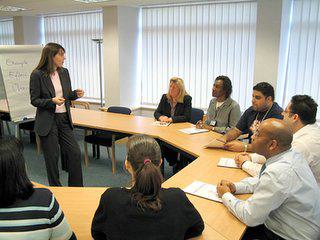Staff like donors? Recruit, develop, retain them…
In this article Patrice Simonnet advises us to use the same techniques on our fundraising staff as those we use on our donors.
- Written by
- SOFII
- Added
- April 01, 2011


101fundraising. OK, so back to the basics of fundraising, hey? Let me think, should I write about ROI, LTV, DRTV, hmm… yeah, why not! But perhaps a more core principle?
Found it! Let’s talk about people.
I can see your face but don’t worry I won’t tell you for the 102nd time that “people give to people”. You know all about it. So, let’s have a look at us fundraisers after all we are people and perhaps the best asset of a fundraising programme (OK , just after donors).
So, my first post is dealing with what I have spent the most time on since I became a fundraising director some years ago - human resources! How to recruit, retain and develop good fundraisers for your programme. Because, let’s face it, you may be a real genius but you still need people to implement the strategy you’ve designed for your organisation. The good news is that dealing with human resources is comparable to dealing with a direct marketing programme - you need to recruit staff, engage them, develop their contribution, and get the best from them as long as you can retain them.
Below is my advice for medium-sized NGOs in most of the countries where wages are lower than the UK or international markets. I hope that these tips will open a wide discussion and please, please give us your personal views and comments below this blog post.
1. Are you prepared for that?
Struggling to convince your board and CEO to bring new staff on board? I bet you are. You need to be strategic about it and plan it seriously. What is the right timing e.g. during your budgeting period or after announcing good results? What's in your communication pack? Take time to get other managers on board . Have you prepared a brief or a business plan? Use some reminders. Diplomacy could be useful too.
Even after getting the green light, how many of us have been struggling to recruit the right person or the right team? If you didn’t get to that seniority, just think about yourself being recruited and, here you go, you have a lot to replicate. Some ways to get some help:
- Management studies are an asset.
- Specialised books found on Amazon or specific training.
- Getting advice from your experienced colleagues and friends.
- But, let’s face it, only more experience in recruitment is the way to become good at it.
2. How to recruit?

Forget that you will get the right people just by posting a traditional job advertisement in a traditional newspaper:
- Pair up with someone from your HR team. Always run interviews together as HR people will validate some points we sometimes forget as fundraiser and also s/he will be in charge of dealing with salary and benefits negotiations. Also make sure you take a look at the job ad and make it as inspiring as you would do with a DM pack.
- Send the job ad to your network and do not hesitate to have a chat or a drink with someone that you would like to work with.
- If you don't have one already, develop a scoring model that takes into account the weight of each question. It will help you when comparing the candidates and help to explain your choice if needed. Also, sleep on your decision first and don’t decide on the same day as you run the interview.
- Do not underestimate the time the whole process will take. Sometimes three to five months could be necessary.
- Take some time to call or write to short-listed candidates that didn’t receive the job offer, you will probably meet them again in your career.
- Everybody, I said everybody, finds our job sexy but how many are really serious about doing it? Be careful with people saying they will move city for that job or leave their six digit salary and current position. They are perhaps not telling the truth or may last a very short time in the new job.
- Even if they don't fit a specific vacancy, some candidates could be good for the next one. Keep track of their applications and do not hesitate to forward them the new opportunity.
3. How to retain?
Our industry just can’t help it, it loves the following word “turnover”.
- Decide your style of management and stick to it. You don’t have to be friends with the people that are working for you, but at the same time, is it fair to be a micro-manager?
- A lot depends if you can manage career evolution and decide on training packs. It is always important to have people realising they are following a “path”. When they are not anymore, they will look for a new opportunity outside your organisation right away.
- No staff member should be irreplaceable, so look at your structure and plan who could be promoted in charge in case of a sudden resignation. Someone from the team should be able to step in rapidly. It probably will be you, so be prepared to dump some work that was planned.
- Can you include a minimum of two- to six-month's notice in all contracts? If not, try to negotiate with resigning staff to stay until you find someone to replace them.
4. How to develop?

It takes time and willingness to cultivate a working relationship with your staff, like with friends or family. So allocate time to it and do not think about it once a year only, for mandatory evaluations.
- Convince your organisation to allocate a budget for training directly in your department budget, or at least under your guidance.
- Spend some time with each staff member once a year, examine what training could be useful for them and insert it in their performance plan.
- Assign them an innovative project they can develop at their pace. This will challenge them and you can always step in to validate the key decisions.
- Coach them (there are so many books about this) and share / validate your strategic decisions with them. They will feel fully on board.
- Ask yourself, are your staff still motivated and inspired by your organisation's mission? If not, why don’t you send them to observe the operations part of your organisation?
5. How to reactivate?
Don’t worry you usually don’t need to do this. This differs from your fundraising campaigns. But it doesn’t mean you should not keep in touch with former staff or colleagues. They are a good asset for benchmarking and here again you can develop your network.
I am sure all of you can add a lot of good tips to this post, so please do so! I just would like to conclude by asking you the following - are you convinced that retaining staff can be very productive? That you won’t have to deal with long recruitment processes and you won’t have to postpone some activities after a strategic member of staff decides to leave? So perhaps it is time to convince our organisations that a clear retention staff strategy should be implemented. Do we realise the cost of losing a valuable strategic staff? Measuring ROI is a great tool, but what about creating the LONI or Loss On Non-Investing ratio? And what about the LONF or Loss On Non-Firing ratio?
Other issues that I would love to have your feedback on are:
- How can we attract people from the profit world?
- Where is the huge gap between wages in the UK and rest of Europe coming from?
© 101fundraising 2011























